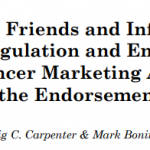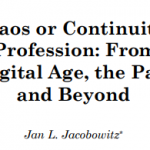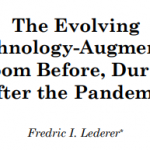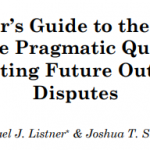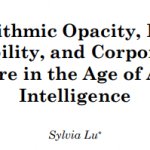Articles
To Win Friends and Influence People: Regulation and Enforcement of Influencer Marketing After Ten Years of the Endorsement Guides
Apr. 9, 2021—Craig C. Carpenter & Mark Bonin II | 23 Vand. J. Ent. & Tech. L. 253 (2021) For the last ten years, social media influencer marketing has been regulated by the Federal Trade Commission (FTC) under the FTC’s Section 5 “unfair practices” authority, guided by the Endorsement Guides, a “best practices” document published by the...
Chaos or Continuity? The Legal Profession: From Antiquity to the Digital Age, the Pandemic, and Beyond
Apr. 9, 2021—Jan L. Jacobowitz | 23 Vand. J. Ent. & Tech. L. 279 (2021) The idea of individuals entering into a social contract to relinquish some of their rights in order to have a civilized society protect their fundamental rights originates at least as early as ancient Greece, where it was espoused by the philosopher Epicurus....
The Evolving Technology-Augmented Courtroom Before, During, and After the Pandemic
Apr. 9, 2021—Fredric I. Lederer | 23 Vand. J. Ent. & Tech. L. 301 (2021) Even before the COVID-19 Pandemic, technology was changing the nature of America’s courtrooms. Access to case management and e-filing data and documents coupled with electronic display of information and evidence at trial, remote appearances, electronic court records, and assistive technology for those...
Fair Play: Notes on the Algorithmic Soccer Referee
Apr. 9, 2021—Michael J. Madison | 23 Vand. J. Ent. & Tech. L. 341 (2021) The soccer referee stands in for a judge. Soccer’s Video Assistant Referee (VAR) system stands in for algorithms that augment human deciders. Fair play stands in for justice. They are combined and set in a polycentric system of governance, with implications for...
The Threat of Deepfakes in Litigation: Raising the Authentication Bar to Combat Falsehood
Apr. 9, 2021—Agnieszka McPeak | 23 Vand. J. Ent. & Tech. L. 433 (2021) Deepfakes are all over the internet—from shape-shifting comedians and incoherent politicians to disturbingly realistic fake pornography. Emerging technology makes it easier than ever to create a convincing deepfake. What used to take significant time and money to develop is now widely available, often...
Watching Androids Dream of Electric Sheep: Immersive Technology, Biometric Psychography, and the Law
Apr. 9, 2021—Brittan Heller | 23 Vand. J. Ent. & Tech. L. 1 (2021) Virtual reality and augmented reality present exceedingly complex privacy issues because of the enhanced user experience and reality-based models. Unlike the issues presented by traditional gaming and social media, immersive technology poses inherent risks, which our legal understanding of biometrics and online harassment...
A Litigator’s Guide to the Galaxy: A Look at the Pragmatic Questions for Adjudicating Future Outer Space Disputes
Apr. 9, 2021—Michael J. Listner & Joshua T. Smith | 23 Vand. J. Ent. & Tech. L. 53 (2021) Since the beginnings of the space age, outer space activities have been the realm of government with ancillary involvement by non-governmental actors. The international legal framework for outer space contemplated the involvement of non-governmental actors, but in creating...
Algorithmic Opacity, Private Accountability, and Corporate Social Disclosure in the Age of Artificial Intelligence
Apr. 9, 2021—Sylvia Lu | 23 Vand. J. Ent. & Tech. L. 99 (2021) Today, firms develop machine-learning algorithms to control human decisions in nearly every industry, creating a structural tension between commercial opacity and democratic transparency. In many of their commercial applications, advanced algorithms are technically complicated and privately owned, which allows them to hide from...
